Materials Handling - Crane and Hoist Hand Signals
On this page
When should the crane operator follow hand signals?
Back to topA crane operator should always move loads according to the established code of signals, and use a signaller. Hand signals are preferred and commonly used. A signaller may be required by law, especially if the operator's view of the load, landing, and intended path of travel is obstructed. Signallers are also needed when the operator is too far from the load to judge distance accurately or when the hoisting equipment is working close to powerlines.
A crane operator should move loads only on signals from one signaller unless the signaller cannot see the load or operator at all times. If signallers are changing between each other, the one in charge should wear a clearly visible sign of authority when possible.
A crane operator must obey STOP signals no matter who gives it.
Who can be a signaller?
Back to topSignallers must have the appropriate knowledge, training, and experience. Health and safety legislation is specific about which workers can perform the role of signaller, including workers who are:
- Competent - Alberta, New Brunswick, Newfoundland, Nova Scotia, Ontario, and Prince Edward Island
- Qualified - British Columbia and Yukon
- Trained - federal employers (person instructed by the employer), Manitoba, Quebec (must be given theoretical and practical training on the duties they are to perform), Saskatchewan (sufficiently trained), Northwest Territories (trained to carry out their duties), and Nunavut (trained to carry out their duties)
What should you do when in charge of signalling?
Back to topThe signaller must:
- Make sure there are no hazards in the area before beginning.
- Wear high-visibility safety apparel.
- Be in clear view of the crane operator.
- Have a clear view of the load and the equipment.
- Keep persons outside the crane's operating area.
- Never direct a load over a person.
- Not do any other job while signalling.
When visual signals from a signaller will not be effective, for example due to distance, weather, etc., the employer must provide the signaller and the operator with a telephone, radio, or other audible signalling device.
What are examples of some common hand signals?
Back to topHoist: With forearm vertical, forefinger pointing up, move the hand in a small horizontal circle.
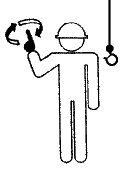
Lower: With an arm extended downward, forefinger pointing down, move the hand in small horizontal circles.
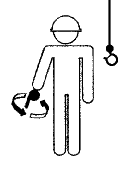
Multiple Trolleys: Hold up one finger for block marked "1" and two fingers for a block marked "2." Regular signals follow.
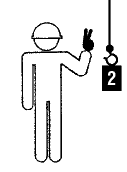
Multiple Trolleys
Bridge Travel: Arm extended forward, hand open and slightly raised, make a pushing motion in direction of travel.
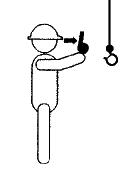
Trolley Travel: Palm up, fingers closed, thumb pointing in direction of motion, jerk the hand horizontally.
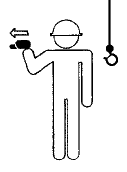
Stop: Arm extended, palm down, hold the position rigidly.
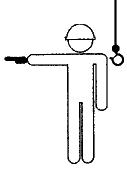
Emergency Stop: Arm extended, palm down, move the hand rapidly right and left.
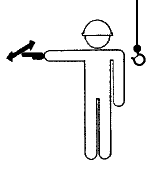
Magnet Is Disconnected: Crane operator spreads both hands apart, palms up.
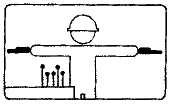
Dog Everything: Clasp hands in front of the body. "Dog everything" means PAUSE. This signal can be used on potentially risky occasions such as when it has started raining, when the load doesn't fit the space for which it was planned, or when a bystander gets too close to the action.

What are some common hand signals for crawler, truck and locomotive cranes?
Back to topUse Main Hoist: Tap fists on head; then use regular signals.
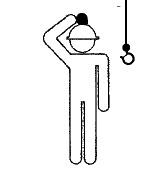
Use Whip Line (Auxiliary Hoist): Tap elbows with one hand; then use regular signals.
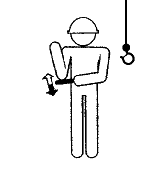
Raise Boom: Arm extended, fingers closed, thumb pointing upward.
Lower Boom: Arm extended, fingers closed, thumb pointing downward.
Swing: Point with a finger in direction of swing of a boom.
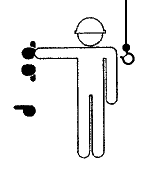
Raise the Boom and Lower the Load: Arm extended, fingers closed, thumb pointing upward, other arm bent slightly with forefinger pointing down and rotate hand in horizontal circles.
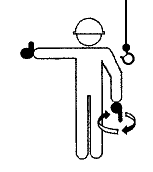
Lower the Boom and Raise the Load: Arm extended, fingers closed, thumb pointing downward, other arm with forearm vertical, forefinger pointing upward and rotate the hand in horizontal circles.
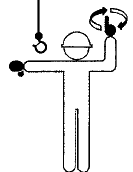
Move Slowly: Use one hand to give any motion signal and place the other hand motionless in front of the hand giving the motion signal. (Hoist Slowly shown as an example.)
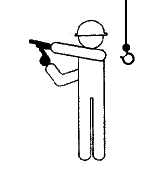
Retract Boom (Telescoping Booms): Both fists in front of body with thumbs pointing toward each other.
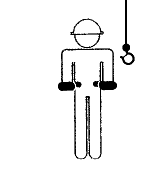
Extend Boom (Telescoping Booms): Both fists in front of body with thumbs pointing outward.
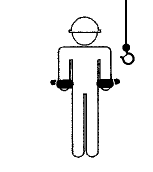
What are some signals for crawler cranes only?
Back to topLock Track: this side as indicated by raised fist.
Turn Travel Track: this side in direction shown by revolving fist.
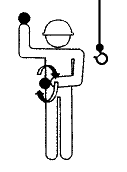
Turn Travel Track
Travel Both Tracks: forward or backward by revolving fists.
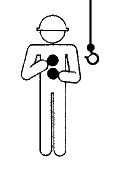
- Fact sheet last revised: 2025-03-11

